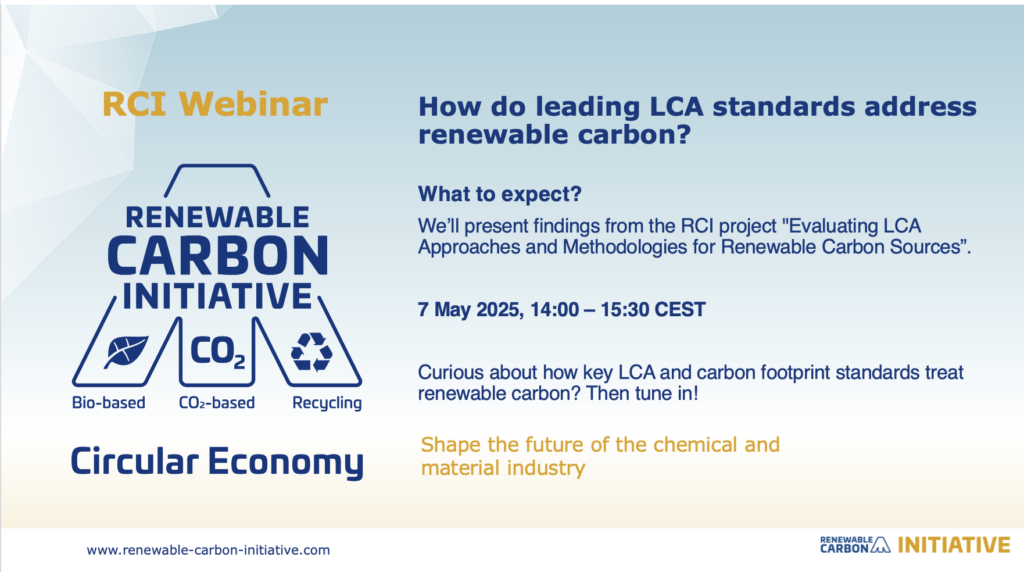The lack of harmonisation makes it difficult to interpret LCA results, as different frameworks and guidelines use different methodologies. This is particularly relevant for renewable carbon-based products, which are often in competition with their fossil counterparts.

In a study commissioned by the Renewable Carbon Initiative (RCI), the nova-Institute has analysed the most relevant LCA and carbon footprint studies and their implications for renewable carbon-based products. The results will be presented in a free webinar on 7 May.
An analysis of LCA and carbon footprint standards
This study reviewed how key LCA and carbon footprint standards treat renewable carbon, including:
- The international LCA and carbon footprint standards ISO 14040, ISO 14044 ISO 14067
- The European Commission’s Product Environmental Footprint (PEF)
- Industrial initiatives Together for Sustainability (TfS) and Pact’s Pathfinder framework
- The Greenhouse Gas Protocol Product Standard
- The Environmental Product Declaration (EPD) framework
Core elements of LCAs for renewable carbon products were examined for their implications for renewable carbon-based products. The webinar will highlight areas of alignment within the frameworks, such as:
- The approach to biogenic carbon accounting
- The general approach to recycling
Areas of divergence within the standards will be discussed, including:
- Credits for the substitution of co-products
- Provisions for the application of economic and mass allocation
A Webinar on LCA for Renewable Carbon Solutions
This webinar is perfect to get an overview of provisions and gaps in existing LCA standards and learn on what to focus on when interpreting LCA results.
Wednesday, 7 May 2025 from 14:00 to 15:30 CEST
Register here: https://us06web.zoom.us/webinar/register/WN_6qi6RW9oR9KhAZ-SECgfzQ
The Study
The study conducted by nova-Institute on behalf of RCI provides a comparative evaluation of how major sustainability frameworks approach methodological choices, highlighting key areas of agreement and divergence.
The study is published in three reports: report 1 (146 pages) evaluates methodological choices which impact LCAs for products containing renewable carbon in existing LCA frameworks and guidelines. The study specifically examines the similarities and differences in the methodological choices (for elements depicted in Figure 1) of guidelines, as well as the implications of these methodological aspects on the LCA outcomes. The frameworks were selected based on their relevance and legitimacy in the industry, academia and policy field, and include: ISO 14040/44, ISO 14067, GHG Protocol Product Standard, PACT’s Pathfinder Framework, the PCF Guideline for the chemical industry by Together for Sustainability (TfS), EPD for the construction industry – ISO 14025 and EN 15804, the Renewable Energy Directive, the Product Environmental Footprint (PEF) and the JRC’s plastics LCA methodology. One field with a particularly large methodological freedom is recycling. Therefore, in report 2 (36 pages) a special focus is given to renewable carbon in recycling situations and challenges for LCA and carbon footprint studies. Report 3, a non-technical summary (15 pages) highlights the main insights of the project results and states Key take-aways for policy-makers.
Source
Renewable Carbon Initiative, original text, 2025-04-17.
Supplier
European Commission
Renewable Carbon Initiative (RCI)
Share
Renewable Carbon News – Daily Newsletter
Subscribe to our daily email newsletter – the world's leading newsletter on renewable materials and chemicals










